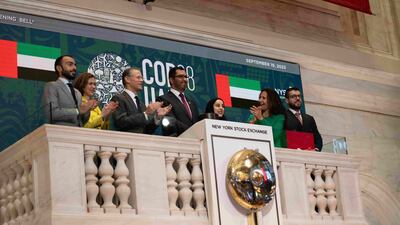The current climate scenario is one of pressing urgency. Recent data from 2023 shows an unprecedented pattern of escalating temperatures, with each month setting new records. This reality positions climate change not as a looming threat but as an immediate and devastating global crisis.
Reflecting on the insightful words of the late American writer James Baldwin – "Not everything that is faced can be changed, but nothing can be changed until it is faced" – we approach Cop28 in Dubai. This conference is pivotal in confronting a crisis of our own making and offers a beacon of hope for initiating transformative actions.
Evaluating the efficacy of Cops requires a lens focused on long-term commitments rather than immediate spectacle. Since the Paris Agreement, there has been a discernible shift in global warming projections. Initially, temperatures were predicted to rise by over 3°C above pre-industrial levels by 2100 if policies remained static. However, current policies have led to adjusted forecasts, now suggesting a rise of about 2.5-2.9°C. Although these figures still pose significant risks, they represent a marked improvement and validate the power of collective international action.
According to The Economist, a significant post-Paris development is the widespread adoption of net-zero targets. From a singular nation in 2015 – Bhutan – more than a hundred countries now embrace net-zero ambitions. This widespread acceptance signals an evolving global consensus that urgently requires accelerated action.
The recent collaborative statement from US President Joe Biden and Chinese President Xi Jinping further energises this momentum. Their mutual commitment to reducing methane emissions and increasing renewable energy capacity threefold by 2030 exemplifies leadership and co-operation. The UAE, hosting Cop28, aims to establish this event as a turning point for realising these ambitious objectives.
The challenge is to attract adequate investment to meet these goals, as highlighted by Bloomberg. Realising this objective transcends mere commitments. It necessitates a practical overhaul of energy markets, streamlining permit processes, enhancing grid infrastructures, and eliminating policies that favour fossil fuels over renewable sources. It's crucial to acknowledge that Cops, while fundamental, are not panaceas. The growth in renewable energy, for example, is more a result of market forces and technological progress than direct outcomes of Cop resolutions.
The private sector is now called upon to play a decisive role. It must identify and engage in viable, profitable opportunities that align with sustainable development goals.
Looking ahead, there will be another stocktake in 2028, which presents a crucial juncture for reviewing progress and adjusting strategies. To align with the International Energy Agency's net-zero by 2050 vision, a dramatic increase in point-source carbon capture — a 30-fold increase this decade — is essential. Despite the technology currently accounting for only 0.1 per cent of global emission capture, this gap represents not just a hurdle but an opportunity for innovation and substantial investment.
We are also confronting the multifaceted issue of climate justice. Developing nations disproportionately affected yet least responsible for emissions, necessitate both financial aid and technological support. Addressing their needs is not solely an ethical obligation but a strategic imperative for achieving comprehensive global climate objectives.
This week, Cop28 introduces a significant evolution by including private sector and philanthropic leaders in the dialogue for the first time. The Cop28 Business and Philanthropy Forum is a testament to the evolving approach towards climate action. We are equipped with the necessary data, technology and a global framework. What is required now is an unwavering commitment to implementation, investment and innovation. Cop28 is not just another conference; it is a pivotal moment to transform our climate narrative, inspiring lasting and impactful actions in its wake.
The numbers speak volumes: the private sector, a powerhouse of financial might and innovation, invested more than $500 billion in renewable energy and clean technologies in 2020 alone, according to Bloomberg. This investment capability is pivotal for environmental projects on a scale necessary to make a real impact. On the philanthropy front, organisations filled crucial funding gaps, contributing $7.8 billion in 2019 towards climate change mitigation and adaptation, as reported by ClimateWorks Foundation.
Moreover, the private sector is not just about finance. It is responsible for about 75 per cent of global research and development, as highlighted by the Unesco Science Report, underscoring its crucial role in driving sustainable technological advancements. This investment in innovation is critical for advancing sustainable technologies and practices. Further, with their global reach and influence, private sector companies have the unique ability to implement and scale sustainable solutions across international borders, making their role in global climate initiatives such as Cop28 invaluable. Their involvement goes beyond mere monetary input; it's about leveraging their resources, expertise and global presence to catalyse comprehensive and lasting environmental change.
These facts and figures underscore the significant role that these entities play in shaping a sustainable future, making their presence at the negotiating table at Cop28 not just beneficial but indispensable for meaningful progress in tackling global climate challenges.
As we gather in Dubai, let us seize this opportunity with determination and foresight. Our actions today will define our global climate legacy for generations to come.


